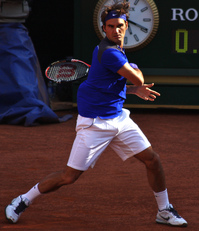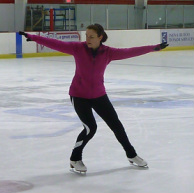 Very few athletes reach the pinnacle of their sport. Years of hard work, sacrifice and conditioning can and do pay off for some. On top of their game, they sail through, confident and seemingly unbeatable. Until the day comes that they start to notice a little slip here or there. A match that was a little more difficult to win. A lost step or two. Physical or mental mistakes that never happened before. It's a strange feeling for these athletes. They are often ill-equipped to respond. Their focus becomes to battle back to the top, to grasp whatever they can to keep from slipping. The joy they felt when playing may be slipping as well. Consider tennis elite Roger Federer, 32, who after a stellar career has been stumbling a bit of late. After enjoying so many years of success and intimidating opponents with his mere presence on the court, he has found himself slipping in the ranks, losing matches to lower-ranked players. Struggling to find a way to give his play a boost, he even tried a bigger racket, something his game had never required before. It didn't work. It may have actually caused his mental game to suffer as well. Often tossing a new element into the mix can cause chaos. Suddenly his play was not as automatic. He needed to essentially start over and reestablish his routine, develop motor skills and coordination to deal with the new racket. (He has since gone back to "old faithful.") He was grasping, trying to find what was wrong. He went for a physical change first, when maybe it was his mental game that could have used the tweaking. A full assessment of both his mental and physical game could yield appropriate areas that may need adjustment to help him get back to form. But all he knew was that something had to change to avoid the trajectory he was on. It's hard to see or admit when the years start to catch up. But clear focus and attention is necessary. If you are still passionate about the game no matter the outcome, keep playing. If losing your status is important, however, consider hanging up your competition hat. Long before his retirement at age 30, Andy Roddick, for example, decided that he would retire the moment his ranking fell to below a certain point. While he likely felt the same anxiety upon realizing he was falling, he at least had thought it all through. He had a plan. This is a good lesson for any athlete. While it is very hard to even consider retirement while riding the peak of athletic success, it will be so helpful in the long run when--yes, when--that time arrives. Federer is a strong competitor, and seems to now be formulating such a plan. "Every match gives me more information to tell me if I'm on the right path or not," he says. "I'm a strong believer that I am on the right path now. I just need to make sure that mentally I stay cool about it." He needs to find a way to stay confident and to keep believing in himself, in a sport where the mental game can make the difference between a win and a loss. When an opponent steps on the court and sees that you know how good you are, senses that you feel invincible, unbeatable, you have the edge immediately. I think Federer can pull this off. As long as he can show he still feels he can dominate, he'll be fine. He will definitely benefit from having a clear, objective plan for his tennis future, which will reduce his anxiety and his panicked attempt to grasp onto things that may do more harm than good to his game. The time will come when he can comfortably pull away from the competitive arena, knowing he gave his all, made his mark, and bowed out with dignity.
0 Comments
Leave a Reply. |
"Even if you are on the right track, you will get run over if you just sit there." Personal Best SportsThe sports world is filled with stories of perseverance, failure and success, personal struggles and public triumph. Each story provides insight into the mental side of sport and activity. Archives
March 2016
Categories
All
|

